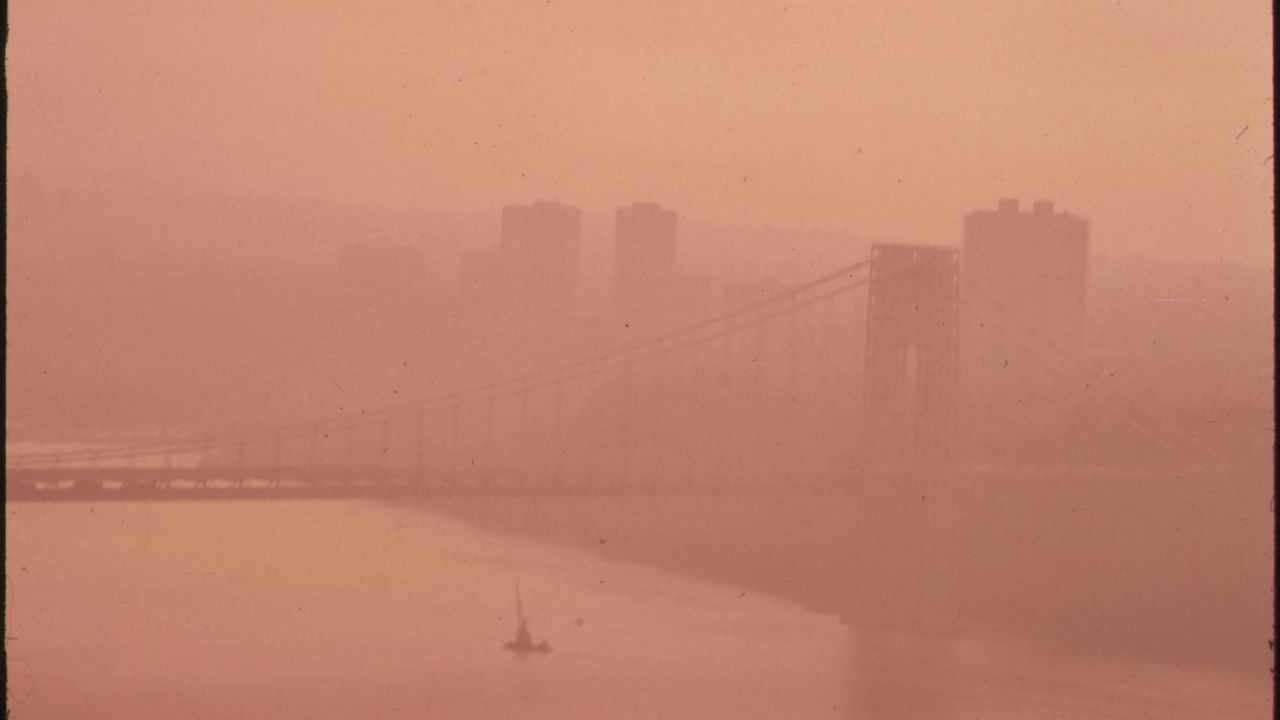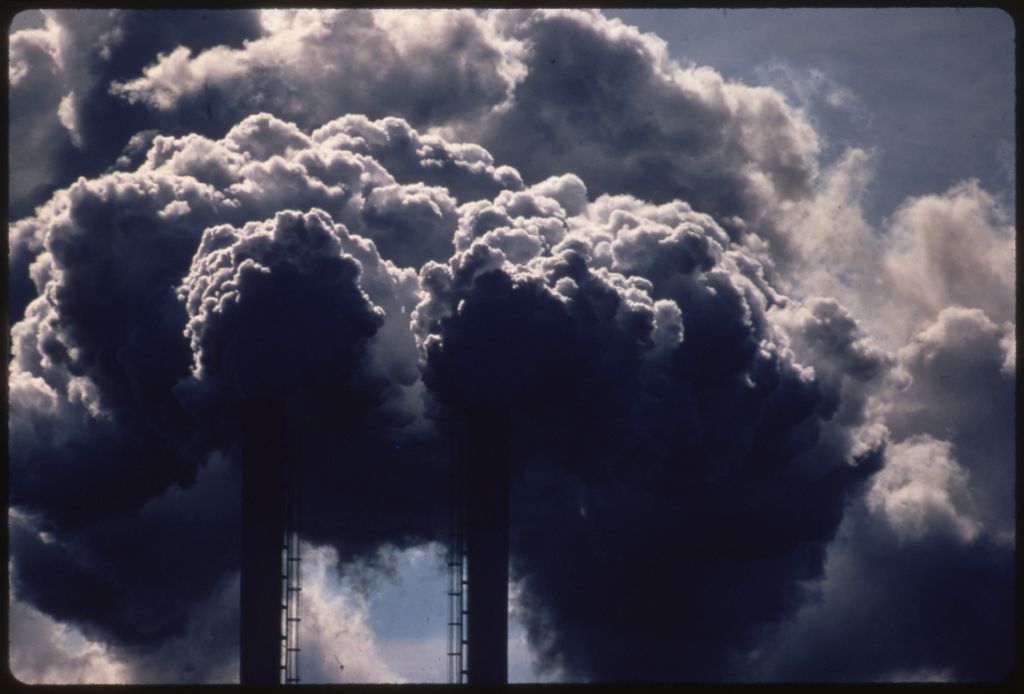
The George Washington Bridge in heavy smog, photographed during the early 1970s before many of today's clean air protections were put in place. This photograph is part of the Environmental Protection Agency's series to "Photographically Document Subjects of Environmental Concern," compiled 1972-77. (The US National Archives/Flickr)
We’re two weeks into the Trump administration and already it’s clear that on the campaign trail our new president was not overstating his antipathy for efforts to combat global warming. In fact, if anything, he understated his desire to demolish the Environmental Protection Agency, the federal agency through which President Obama tried to reduce climate change-causing pollution.
While the long-term effects of President Trump’s plans for the EPA are worrying — the director of the EU’s Environmental Agency says there’s “not a snowball’s chance in hell” of containing global warming without US cooperation — his proposed cuts in the budget and staff at the agency will also have dramatic short-term effects.
— Ken Kimmell, Union of Concerned Scientists
Here’s just some of what’s in store: Trump’s team has more than $800 million in budget cuts planned for the agency. To head it, Trump nominated Scott Pruitt, who, while attorney general of Oklahoma, made fossil-fuel industry allies proud with his relentless efforts to derail the EPA’s rulemaking. What’s more, Trump has signed an executive order to eliminate two regulations for every one adopted, a policy that seem to have been crafted with environmental protection directly in its crosshairs. Myron Ebell, who headed Trump’s EPA transition team, told the Associated Press that ideally, the agency’s 15,000-person staff will be reduced by 50 percent — or more. “Let’s aim for half and see how it works out, and then maybe we’ll want to go further,” he suggested last week.
Ken Kimmell, president of the Union of Concerned Scientists and a former commissioner of the Massachusetts Department of Environmental Protection, said, “The inevitable consequence of budget cuts of that magnitude would be a reversal of about the last 50 years of improvements in air quality, improvements in water quality and greater safety from chemicals that cause diseases in people. There is no way of soft-pedaling this or sugar coating it: A cut of that magnitude would mean dirtier air and dirtier water for the American public.”
We spoke with Kimmell for a firsthand look at how the EPA affects public health and everyday people’s lives. Kimmell worked closely with the EPA during his time in state government, and the Union of Concerned Scientists is forcefully speaking out against the new administration’s environmental agenda.
We should be focused on clean and beautiful air — not expensive and business closing GLOBAL WARMING — a total hoax!
— Donald J. Trump (@realDonaldTrump) Dec. 28, 2013
Give me clean, beautiful and healthy air — not the same old climate change (global warming) bullshit! I am tired of hearing this nonsense.
— Donald J. Trump (@realDonaldTrump) Jan. 29, 2014
While Donald Trump has often pushed the idea that the government can protect the air and water without worrying about climate change, the dramatic cuts his administration has planned would prevent the agency from doing any of the above. Trump’s plans, Kimmell said, “would eviscerate EPA’s ability to enforce environmental laws, to make sure that people have clean water that they can trust when they turn on the tap, that they can breathe clean air when they go for a jog, that if they live near a landfill it’s not leaking.”
When the story of Flint’s water crisis made national headlines at the end of 2015, it prompted outrage and promises from politicians of both parties. The story was an instance of both state and federal regulators falling asleep at the wheel, ignoring evidence and dragging their feet on the response. This sort of public health disaster will become far more common if regulators, instead of dropping the ball, aren’t present at all, Kimmell said. A recent investigation by Reuters finds that nearly 3,000 neighborhoods around the country have lead levels significantly higher than Flint’s; this news should be cause for ramping up environmental enforcement, not scaling it back.
Kimmell also pointed to the 2014 Elk River spill in West Virginia as an example of what can result from too little regulation, and said it was a cautionary tale illustrating a scenario that could unfold more often if the EPA is understaffed and strapped for cash. After 4-methylcyclohexane methanol, a sweet-smelling, coal-cleaning chemical about which little is known, was found leaking from storage tanks owned by a company called Freedom Industries, West Virginia’s governor declared a state of emergency in nine counties. Three hundred thousand people went without potable drinking water for days. Shortly after, Freedom Industries filed for bankruptcy, largely dodging responsibility. The spill illustrated that dealing with an environmental crisis after it unfolds is far harder than preventing one from happening in the first place.

Factory burning car batteries in 1972. (The US National Archives/Flickr)
The EPA also plays a critical role in cleaning up toxic sites dating back to an era when regulation was loose or nonexistent. “These cleanups are enormously expensive and often very technically difficult to execute,” Kimmell said. “Certainly there are states in which state environmental protection officials have some of the technical expertise to help in those, but in the big sites, particularly the Superfund sites, EPA’s involvement is always needed, and this would be the kind of service that EPA provides that not only protects our environment but helps our economy, and that could get lost in budget cuts.”
The EPA also produces data and scientific reports on which policymakers rely. These reports include information about the sources of pollutants that harm public health. If the EPA’s resources are cut, it will become less able to produce these reports. Policymakers will have to rely on the polluters themselves — say, a car company or an electric utility — to provide an honest accounting of how much pollution they’re generating. If these polluters know that an honest accounting could mean stricter regulations, it’s no surprise that they have an incentive to bend the truth.
While states have their own agencies tasked with protecting the environment, those agencies receive funding and assistance from the federal EPA. Any cuts at the top would trickle down. Some states — particularly populous, progressive states like those in the Northeast and on the West Coast — would likely find a way to pick up some of the slack, but other states would not. America already has a patchwork of environmental regulations, and this situation would become more extreme, with some states enforcing existing laws and creating new ones while other states throw up their hands.
And, Kimmell notes, regulating pollution at the state level is often not enough protection. Air pollution drifts across state lines, and water pollution travels downstream. “The state of Maryland could literally shut down its entire industrial base,” he said, “and it would still not be in compliance with health-based standards because of all the pollution that’s coming from other states.”
With a weakened EPA and underfunded state environmental agencies, it would fall to citizens to enforce environmental laws. “Citizen suit” provisions in the Clean Air Act and Clean Water Act allow individuals to sue polluters if environmental regulators fail to take action. But this do-it-yourself approach to environmental protection is not a solution, Kimmell said: “The amount of resources that would need to be expended to bring these suits is tremendous, and these groups don’t have access to all the information EPA has. They won’t replace what we’re going to lose if we take away EPA’s ability to enforce our clean air and clean water laws.”




